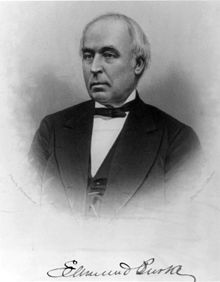Edmund Burke (congressman)
| Edmund Burke | |
|---|---|
 |
|
| United States Commissioner of Patents | |
|
In office May 5, 1846 – September 3, 1850 |
|
| Appointed by | James Polk |
| Preceded by | Henry Leavitt Ellsworth |
| Succeeded by | Thomas Ewbank |
| Member of the U.S. House of Representatives from New Hampshire's At-large district |
|
|
In office March 4, 1839 – March 3, 1845 |
|
| Preceded by | James Farrington |
| Succeeded by | Mace Moulton |
| Personal details | |
| Born |
January 23, 1809 Westminster, Vermont |
| Died | January 25, 1882 (aged 73) Newport, New Hampshire, U.S. |
| Citizenship | US |
| Political party | Democratic Party |
| Spouse(s) | Ann Matson Burke Mary E Whitney Burke |
| Children | Frances Matson Burke Dana |
| Profession | Lawyer Newspaper editor Politician |
| Military service | |
| Allegiance |
|
| Service/branch | New Hampshire Militia |
| Rank | Adjutant Brigade inspector |
Edmund Burke (January 23, 1809 – January 25, 1882) was an American lawyer, newspaper editor and politician. He served as the United States Commissioner of Patents and as a U.S. Representative from New Hampshire in the 1800s.
Born in Westminster, Vermont, Burke was the son of Elijah and Grace (Jeffers) Burke. He attended the public schools and studied law with Henry Adams Bellows, future Chief Justice of the New Hampshire Supreme Court. Burke was admitted to the bar in 1826. He began practicing law in Colebrook, New Hampshire before moving to Claremont, New Hampshire in 1833.
He assumed editorial management of the New Hampshire Argus, and when he moved to Newport, New Hampshire in 1834, he united the Argus with the New Hampshire Spectator of Newport. The newly created Argus and Spectator was a political newspaper. He was commissioned as an adjutant in the New Hampshire State militia in 1837 and as brigade inspector in 1838.
Elected as a Democrat to the Twenty-sixth, Twenty-seventh and Twenty-eighth Congresses, Burke served as United States Representative for the state of New Hampshire from March 4, 1839 to March 3, 1845. He was not a candidate for renomination in 1844.
He was appointed Commissioner of Patents by President Polk and served from May 5, 1846 to September 3, 1850. While serving in that office, he wrote a series of articles about the tariff under the signature Bundelcund. The articles were written for The Washington Union and circulated as a pamphlet.
...
Wikipedia
